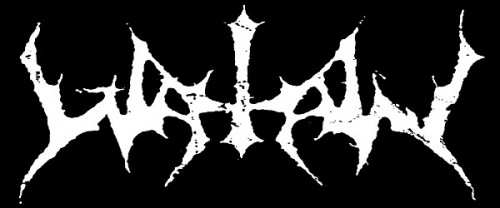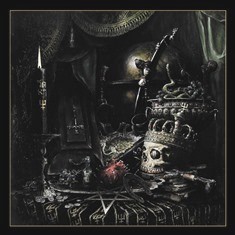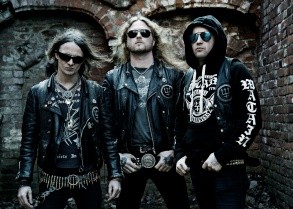Watain interview (07/2013)

| With: | Erik "E." Danielsson |
| Conducted by: | D.T. Metal (phone) |
| Published: | 28.07.2013 |
|
Band profile: |
Watain |
I recently had the pleasure of talking with Watain's main man Erik Danielsson about their upcoming release The Wild Hunt. Unfortunately the Skype connection was rather bad that day, so some parts are missing.
After the customary "hi, how are you today" he had to say the following:

Birgit: You were just in New York and Los Angeles to do those listening parties for the new album. How was that experience for you personally?
E.: It was alright. You know, I really don't like those kinds of things to be honest. It easily gets very shallow and corny; bullshit, stuff like that, and I don't like this in relation to Watain's music. I like when things are more extreme and severe and furious - but it was alright I guess, it served its purpose; it is a part of the game I guess. We have done this in Europe before and I don't mind, it's just that this is not my favorite part of being in a band.
Birgit: No pain, no gain I guess. Now, the new album is musically very emotional. Since "They Rode On" was actually the first song you wrote for the new album, did this kinda set the mood for the rest of The Wild Hunt?
Erik: I suppose so. Creatively, we worked in a very open way this time. We didn't bother at all with any type of expectations or whatever people might have been waiting for. Even all of the stuff we had planned before this album, at some point we just said this will be an album for us, one which fits us perfectly. So yes, I think that's why the album became so very, very emotional. Of course "They Rode On" is a good example of that, but it was not the case that this song being written and us kinda leaning back toward this one song. It was just one step out of many I would say.
Birgit: Was it harder to record the (clean) vocals for "They Rode On"?
E.: To be honest it wasn't all that hard. It was all about letting go completely and not giving a fuck. For me, I realized that this is my instrument; I have been the singer in the band for 15 years, so I should be able to express myself in other ways than just one. It falls with that kind of mindset that I started to experiment with the more cleaner stuff and I found myself to be very comfortable with it. So, it really wasn't a big deal for me or the other guys in the band.
Birgit: There is a female doing backing vocals toward the end of the song; who is she?
E.: This is a girl called Anna (last name was not understandable due to connection). She is a friend and close to the band. We chose her because she was - well maybe the only choice we had. She has a highly and very respectful and very passionate approach toward what we do. It really was a natural choice. She has just recorded (?skype broke up?) and people will hear a lot more from her.

E.: Oh, that is a very hard question. Well, we just came out of a one year coal mine per se with all the writing and recording and it's almost impossible to say. But one song that means very, very much to me is "Holocaust Dawn" which is the last track on the album.
It was a song, that in the end, kind of summed up the whole process of recording the album and everything we wanted to say with it. It is a song which is full of equal amounts of sorrow and tragedy as it is on the victory and triumph; about a very divine influence. The song just became very special. It was also the last song we wrote for the album and it was just one of those songs where after we did it, it was like - ok, we are done, that was that - you know.
Birgit: True, a very fitting ending to an album. The intro "Night Vision" starts very calm before you feel an anticipation of what to come and then "Holocaust Dawn" just sums it all up. That's at least how I feel.
E.: That's a good statement. It is a very dramatic album and I always like to work dramatically for the expressions, we don't like doing softly. Yes, I actually like how you are putting this. With those two songs opening and ending, the album becomes very coherent and full somehow.
Birgit: Will Watain ever record a song with Swedish lyrics since so many other bands do this these days?
E.: Well, we never have, but I actually have plans on doing so. We just never had the right inspiration for a song and I was always more fluent in English when it comes to writing the lyrics. But I do write a lot of Swedish stuff, just not for Watain.
Birgit: And speaking of inspiration - other than life itself, are there any other sources of inspirations for your albums, like books or movies?
E.: Well, Watain is first and foremost a way for us to communicate with our gods. It's a way for us to work with our religion and this is the one sole force of inspiration. Everything inside of us, everything that we feel, every emotion that runs through our bodies is in a way connected to Satanism, and it's connected to our gods.
You know, I write about a lot of different subjects, but it's all based on my religious views and on my life as a Satanist. And it's sinful so to say that all the lyrics are written. As far as books, of course they inspire me, to some levels - actually to a great extent they are born out of an idea that I got from reading the Blood Meridian by Cormac McCarthy because it resembles very much the nature of Watain's journey and so on. But in the end, when it all comes down to, I write the lyrics as a way of communication with my gods. For me they are more like prayers or hymns than rock lyrics so to say.
Birgit: The Wild Hunt - what does this title mean to you personally?
E.: To me - The Wild Hunt is really the journey of Watain, you know, our hunt during the last 15 years; after all, it's almost half of our lives. It's a very retrospective record (pause) - I mean, I don't want to make it sound that The Wild Hunt is some kind of biographical story of Watain, but it is very retrospective, and it is very much based on past experiences. I would say it is more the story of Watain but in a religious context, a divine context - that is what The Wild Hunt is for me personally.
Birgit: Quick question about the cover for The Wild Hunt; did each of you guys individually decide which symbolic piece will be included for the shrine or was that more of a collaboration?
E.: It was more a matter of collaboration. Everyone was sitting down together, talking about what the songs meant to them and in the end arriving at the point where we had these objects which we wanted to put on the album cover. It was a very - mutual decision and conversation we had and we arrived at the final design which I am really, really happy with actually.
Birgit: Did you tell the artist what you wanted to achieve with the cover and he ran with it or were you totally involved with the arrangements of what goes where?
E.: Oh, we were very actively involved with everything. That album cover is really filled with symbols - well everything, from the arrangement of the objects, to the colors used, to the objects themselves we were involved. There are many hidden numbers and different angles - it's one that will keep people busy thinking for many years I hope.
Birgit: Music is a form of Art and you chose to publicly express yourself in such way. Does it bother you as an artist that some people come to your shows merely for the "ahh shock' factor from your stage setup instead of the music or message you want to be heard?
E.: Emm, I think they can come for whatever fucking reason they want to; I don't care. I think in the long run, what we do on stage will affect people in one way or another. Of course I am bothered when people see us as a freak show because that is really not what it is. On the other hand you really can't ask that much of people; they are only humans and they are not meant to understand concepts that are bigger than their own little heads. If some people want to look at it as a freak show then it might be a consequence of their limited intellect or something like that, and that's fine, they can think whatever they want.
But of course and as you know it is a whole lot more. I think by now our fan base consists of a lot of intelligent people - people who are willing to open themselves a bit more and think a bit further than the general society. And I appreciate that, I appreciate playing in front of those people. But there will always be idiots, everywhere, that's one of the basic facts of life. Luckily we have an audience that consists of more people that are not idiots, which we are very, very thankful for. (laughs)
Birgit: And on that note - will the "Temple Of Watain" be a guiding light for all eternity? Or do you think there might come a time where you feel that you accomplished all you set out to do with your music and call it quits?
E.: To me, there is no end to Watain. I can't put that picture in my head to be honest with you. Watain will always exist in one form or another. Our goal is a constant one, it is really about maintaining this world we have created for ourselves. We created Watain to have a world outside the world of men, a world where we could live free and by our own rules and not be a part of society, not be a part of the world that people know. We want to maintain that and uphold this until the last drop of blood has been drained out of our bodies. And that's what we will do. I think that kind of motivation will definitely allow for ideas to last for a long time. For us it's a matter of life and death; it's our lives we are talking about, not only the band.
Birgit: Four months of studio time and you used different studios to record. How much was recorded at Necromorbus studios with Tore (Stjerna) in the end?
E.: Yes - but we actually didn't record much at Tore's studio, we were just there for pre-production and demoing the songs. It was almost like - weird for us to use that studio again because it was so connected to the recording of Lawless Darkness. The recording was so intense and emotional that we found it very hard to go back there and do another album.
So we did the pre-production there and moved around to different studios. But most of the album was actually recorded in our hometown Uppsala; out of town - in the middle of nowhere. But Tore was with us the whole time actually, in all the different studios
Birgit: And speaking of recording; give us the run down.

Birgit: I know you, personally, play the bass as well as the guitar. Which was your first instrument way back when?
E.: Actually I started with playing drums. (laughs) And that's still my main instrument. But now, for this album I recorded most of the guitars. But yeah, I play any instrument I can get a hold of.
Birgit: Now, for your upcoming show in Uppsala this August; big production, big stage set-up, are there any plans on recording the show for a special live DVD?
E.: We haven't talked about this actually, I suppose we will record it somehow. Right now we are so focused on the new album and what's going on with the show, so plans for (a live release) have to wait I guess.
Birgit: You plan on touring in North America later this year. Will this be a headlining tour or will you be in a support slot?
E.: We will see. We will announce that in one week from now. (laughs)
Birgit: Ok fair enough. Now the famous last words to your fans to wrap it up.
E.: We are coming back and it's going to be very, very interesting times ahead for everyone involved. So brace yourselves, really, and prepare yourselves, because we are going to take you on a very long and hard ride.
 | Posted on 28.07.2013 by Former boss lady. Now just a professional concertgoer... dangerously armed with a camera! |
Comments
Comments: 6
Visited by: 181 users
| Bad English Tage Westerlund |
| BitterCOld The Ancient One Admin |
| Warman Erotic Stains |
| Sunioj |
| NocturnalStalker Metal Addict |
| MuhannadQandah |
Hits total: 10807 | This month: 27





